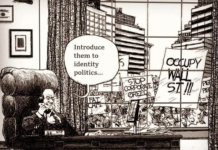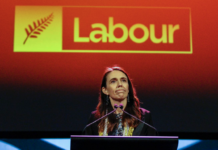ON HIS “POLITIK” WEBSITE, Richard Harman reveals how Environment Minister David Parker upset the co-governance project. Labour’s Māori Caucus saw co-governance becoming a central feature of Parker’s Natural & Built Environments Bill – the legislation poised to replace the Resource Management Act. On the all-important regional bodies established by the legislation, it was assumed that 50 percent of the seats would be reserved for Māori, leaving the rest for the rest.
According to Harman, Parker refused: successfully facing-down the opposition of Nanaia Mahuta and the Māori Caucus “in what may be seen as a defining move by the Government, which has been under fire over the Three Waters co-governance proposals.”
While Harman is undoubtedly correct to interpret Parker’s successful resistance as an important straw in the wind, it would be wrong to count it as a total victory. As Harman, himself, went on to report, the proposed clause in the Natural & Built Environments Bill which states: “that in achieving the purpose of this Act, those exercising functions and powers under it must give effect to the principles of Te Tiriti o Waitangi”, remains intact.
It is important to remember that the co-governance project is justified as a way of giving effect to the principles of the Treaty. Fifty-fifty representation is promoted as the political expression of the supposed Treaty “partnership”. The Natural & Built Environments Bill isn’t out of the woods yet.
Even so, the fact that a Labour cabinet minister has taken a stand against co-governance – with the support of both a Cabinet and a caucus majority – is an extremely important political development. Without Labour, the co-governance project could never have progressed so far. If Parker’s stand is emulated by other Labour MPs, then co-governance will be stopped in its tracks. Neither the Greens nor the Māori Party have the numbers to push it forward against Labour resistance.
What Harman’s reporting makes clear is the alarm which even rumours of Parker’s resistance generated. The Māori Council and their corporate iwi allies – represented by the former National Party Attorney-General, Chris Finlayson – took their concerns to the Waitangi Tribunal. While legal niceties prevented the Tribunal from releasing a definitive judgement on co-governance and the Natural & Built Environments Bill, it did suggest that its absence from the legislation would be undesirable.
Clearly, the Tribunal has become an integral part of the co-governance political machinery, a body of sufficient mana to offer cover for both the project and its political sponsors. The same applies to much of the media, academia, and – more worryingly – the courts. And yet, even this impressive line-up of allies could not hope to save co-governance if it was openly repudiated by a Government.
How far would the co-governance project have proceeded had John Key not agreed to ratify the UN Declaration on the Rights of Indigenous Peoples? How could the Treaty’s “principles”, and its expectations of “partnership”, have been embedded in so many Acts of Parliament had not successive governments declined to take issue with them? The co-governance project may not be the historical offspring of senior National and Labour politicians (like Geoff Palmer and Chris Finlayson) but they certainly provided the room in which it was conceived.
Only now, and only to thoughtfully stubborn individuals like David Parker, is the extraordinary naivete and arrogance required to facilitate the co-governance project becoming clear. It simply did not occur to those Pakeha politicians who set about creating a Māori middle-class to keep the increasingly fractious Māori underclass from setting the country on fire, that their creation might one day turn on its creator. Locating cultural and ideological enemies at the very heart of the colonial state was never likely to produce a happy ending.
Extracting these racial revolutionaries from the strategic locations they have occupied in the course of their “long march through the institutions” is not going to be easy. Judges, in particular, cannot be removed without a great deal of fuss. Ideologically-driven public servants, academics, teachers and journalists are similarly well-placed to defend the “gains” of the racial revolution. And then there’s the younger generations of New Zealanders. These youngsters may not be intellectually or emotionally equipped to challenge the radical orthodoxy of their revolutionary mentors, but they are more than equal to the task of inflicting a lot of harm on their behalf.
All of which adds up to a difficult and potentially dangerous mission should Mr Parker and his Labour comrades agree to accept it. They will have to re-learn both the liberal-democratic catechism of universal human-rights and freedoms (the freedom of expression in particular) as well as the good old democratic-socialist creed that bound the Labour Party and the Ratana Church together so tightly all those years ago. Fortunately, they have at least two very important things going for them. 1) Most New Zealanders – Māori and Pakeha – do not want co-governance. 2) The electorate will reward any government that has the guts to say: “This far, but no further!”





The more co-governance in action New Zealanders see, the more they will despise Labour for imposing it.
The Tribunal is wholly responsible for inventing Treaty principles, so how long until they decide co-governance is a principle? At which point all legislation giving effect to principles must set up go-governanve structures.
At aome point this fight will come to the Tribunal itself, and then it’ll get nasty.
Chris
Parker is up against Jacinda and Roberston. Caving in and doing co-gov will look oh so good over at the UN, not matter what we the voters want. It’s a done deal as long as she is PM. Oh well, more to repeal! I should start the NZRP – NZ Repeal Party. Plenty work for 50,000 bureaucrats for the next two terms undoing crap and ineffective legislation
Removing the works of a tyrant.
Great commentary Chris, thanks.
When you say “Judges, in particular, cannot be removed without a great deal of fuss.” I think it goes much further than that!
Any government intending to extract the radicals/racists from their positions of influence will face social unrest that will likely end in some form of violence. Regardless, it needs to be done in order to set this country back on the right path. See it as the violence of the surgery needed to remove a malignant tumor. Bring it on.
Full marks to David Parker. I think as Auditor General he did the same thing with the Rotorua Bill (can’t remember it’s exact title) that Labour via Tamati Coffey tried to push through
You are quite right, Anker. As Attorney-General, Parker drew Parliament’s attention to the Bill’s abrogation of the NZ Bill of Rights Act. That was enough to put it on hold.
The $64,000 question is whether Parker can build the anti-co-governance resistance in Labour’s caucus to the point where the whole project has to be abandoned.
In the immortal words of Bette Davis: “Fasten your seatbelts: it’s going to be a bumpy night.”
Do we know why David Parker is taking this stance? We are not comparing apples with apples when looking at three waters versus natural and built environments. For starters aren’t the councils determining who goes on the regional bodies? That’s not the case with 3 waters. As Tane pointed out Parker wasn’t opposed to the Hauraki Bill. Maybe it’s horses for courses.
I prefer Mae West’s quip ‘I used to be Snow White but I drifted.’
We need a flexible working arrangement under the co-governance that can drift to either side of the trend line somewhat for the sake of a better outcome that matches the expectations that the broad group of Maori have of Co-Governance, and the hopes of Pakeha and Tauiwi for fair, good, practical outcomes. Co-Governance must be a workable idea resulting in better well-rounded decisions meeting cultural and environmental requirements and implementations, able to drift at the edges, not rigid precepts and attitudes and become seen as an abuse of power leading to increasing disrespect and dissatisfaction.
But then there are issues like this on which he appears to be silent.
“Allan’s Ministry of Justice has formally reported to Parliament that the status of Maori as “Treaty Partners” outweighs the human rights protections including freedom from discrimination guaranteed by the Bill of Rights Act which implements the UN Declaration of Human Rights. You can read this assertion in the MOJ’s opinion on the Pae Ora (Healthy Futures) Bill of 2021″
Yet Labour has done similar in ECan in Canterbury with no whisper from Parker.
I wouldn’t rely on him doing the right thing – I’m not sure the reason for his inconsistency.
Funny that he has allowed co-governance in the Hauraki Marine Park Act Bill.
In the Bill, it gives full and absolute statutory power and authority to the ‘Hauraki Gulf Forum’.
A 50/50 board where half are elected representatives and the other half are unelected.
So what’s he been smoking lately?
This was done over a decade ago as part of the Super City legislation in 2010. So not a Bill, but an Act (that is, passed into law).
As Chris Finlayson has stated, National agreed to co-governance legislation in relation to parts of the conservation estate, and the Waikato and Whanganui rivers.
No. It is yet to be amended again in a new Hauraki ‘Gulf’ Marine Park Act.
“Our Revitalising the Gulf strategy will guide an ongoing programme of work for the long-term health of the Hauraki Gulf. It responds to the call to action in the 2017 Sea Change Tai Timu Tai Pari Hauraki Gulf Marine Spatial Plan, developed by a stakeholder working group, and contains Government actions across the many marine challenges facing the Gulf in a holistic package,” Ayesha Verrall said.
The package includes:
The creation of 18 new marine protection areas and a framework to support the active restoration of some of the most biodiverse regions in the Gulf. The 18 new protected areas will increase marine protection in the Gulf almost threefold.
A Fisheries Plan with a range of changes to fishing practices and catch settings, including restricting trawl fishing to within carefully selected “corridors”.
Better monitoring to improve our understanding of the marine environment and track progress over time.
An expanded programme of protected species management.
Working together with mana whenua and local communities on local area coastal management.
Promoting a prosperous, sustainable aquaculture industry.
https://www.beehive.govt.nz/release/bringing-back-health-hauraki-gulf
And this which the new Act will be based on.
https://www.doc.govt.nz/our-work/sea-change-hauraki-gulf-marine-spatial-plan/
“Most New Zealanders don’t want co governance”. Is that based on an actual survey? Ardern is Key like in that respect as she proved with Capital Gains Tax ( or was she is surrendering to that old prick Peters). If it means loads of votes she would change her stance.
Isn’t it classic that Parker is essentially battling a conservative right winger, Chris Finlayson, over co governance? It just shows all this left equals Māori take over is a complete over simplification of an issue.
Nah that Chris + Trotters wishful thinking ‘ Most New Zealanders – Māori and Pakeha – do not want co-governance.’ most NZers on a daily basis are just trying to survive let alone worried about co-governance which doesn’t translate as ‘do not want’
Well I can guarantee you that most NZrs including most maori folks would rather have potholes fixed so we can still do 100 on roads, rather that wasting money and resources on co governance. How’d you think a poll of that would go ey?
Yeah nah Stephen – i think you will find most NZrs support equal voting rights. Anyway you will soon have your assertion that Chris is ‘wishful thinking’ tested, because ACT has promised a referendum on co-governance if it forms part of the next government. Bring it on.
Your beloved co-governance is about to hit a brick wall Stephen and post-election you will wake up to find that the woke bullshit dust has dissipated leaving Maori no better or no worse than all other New Zealanders (or Aotearoan’s in your own particular ‘brown supremacists parlance perhaps)?
Dont know about Co Governance survey? 3 Waters has been surveyed. With IRO 60% again. Cant remember exactly but definitely more than 50% against. Whether that provides relevance in the context of Co Governance is anyone’s guess.
May be there is one on co governance, can’t find it. I can find the democracy in action 3 waters one from November 2021 with 1159 respondents. That has 47% against the asset transfer away from local councils a high percentage wanting a referendum but i don’t actually see a co governance question in the executive summary.
Just emailed my thanks to Parker. we all need to reward and support him pour encourager les autres – there must be some.
Yes we do need to show support for people in power when they try to do the right things according to need and reasonable principles. It’s easy to be filled with moans and groans, negative stuff. We must remember what it is like to feel happy and express gratitude sometimes – it would be good for their mental health and ours too.
Pleased to see that David Parker is actually….alive.Big disappointment in Govt.
Finally the only one left in the Labour caucus with an LLB and hand on legal experience! takes a stand against the putsch.
Lets watch this space.
Yes hopefully he makes a stand against the tyrants but his inconsistency’s are a puzzle.
Bob do you mean like signing the UN Indigenous Peoples Charter, the Waikato River Settlement Act, etc., when you are in government, then espousing that co governance of a resource is the end of civilisation? That sort inconsistency?
of
No never been a doomsayer so end of civilisation not me.
I’m an optimist.
Not sure what to make of Parker. I think he is trying to balance out his role as AG with his role of Labour Cabinet Minister. Increasingly these 2 roles look to be in conflict.
Good story & Good comments.
It would be refreshing if we did away with this te tiriti nonsense and said;
“that in achieving the purpose of this Act, those exercising functions and powers under it must give effect to the principles of “democracy.”
There should be a law for everyone and within the confines of the law,everyone should be free to follow their cultural, religious or whatever beliefs. When you place cultural or religious beliefs as the law which I fear co governance is trying to achieve in a subtle way, then you end up with edicts coming from the surpreme leaders and all opposition crushed as say racial hate speech.
Once again the co-governance anti-brigade with Chris+Trotter leading the charge and all the merrymen and woman on TDB falling in line to vocalise their personal distaste for something that unites them in their condemnation. ‘MAORI’ Aspirations!!
Maori are mobilising as as people not a fucking race.
The treaty was signed by chiefs according to Maori custom and tinorangatiratanga was promised alongside equal citizenship rights.
Maori didn’t have a vote when the land was taken, nor a vote when the troops invaded.
Race was the label invented by European colonists stamped on black slaves as a justification for treating as inferior.
Centuries later the recognition of this iniquity has led to some redress.
For Maori about 3% of the value of the land and other assets stolen.
This redress is now couched in the 21st century as in terms of ‘co-governance’ to express that Maori should have equal say in the fate of the land and resources stripped off them before all of humanity and most of the other species are destroyed by European predatory capitalism bent on extinction.
The settler gentry, todays bankers, lawyers, landlords and capitalist farmers, fear that the ill-gotten riches they have accumulated may be challenged by those they always presumed to be their inferiors.
Such is their fear that they scarce the shit out of the middle class hanging onto their tails that they too may end up as destitute beneficiaries sharing motel rooms with the underclass.
They pass on the job of sounding the alarm to the media which spins racism into every thread.
They make sure that the organic intellectuals of the settler society spread the memes that the Maori are coming to get your water, you land and your freedom to flee to your beach house.
These intellectuals use their language skills to present what is a just but barely token redistribution of wealth to Maori to compensate for some of the evils of colonisation as the rise of an ethno (use the word race, you racists) state run by a Maori middle class that can take back some of the power you took as you Anglo entitlement and use it to house, feed and educate their people out of poverty, alienation and crime.
So first, your forebears invent the word race to demean non-Euros, then set out to deprive them of their land and culture by force, then when centuries later they claim recompense, you invert the word racist to pretend that deprived, alienated victims of your racism are about to disinherit you and your precious civil rights!
Priceless hypocrisy and doublethink. Always the prerogative of the rich and powerful to define language usage and meaning.
It irks me to see the crowd of neo-colonial creeps flocking to the NACTs race baiting of Maori to get another colonial government into power to protect the exploitative, oppressive capitalist system.
Nah – y’re dreamin’
Dave Brown “promised alongside equal citizen rights” that goes both ways. Equal citizen rights. One person one vote.
Yes the Crown took Maori land and there has been a process to address this. Has it been adequate? Probably not, but compensation rarely makes up for the crime.
Maori also took each other’s land in the Musket Wars 1800 – 30. Sadly this is the history of the world. Pakeha have done more than almost any country to right the wrongs. But that doesn’t mean we have to allow our vote to be diluted.
So DB. How do you categorise the thousands of Maori who feel comfortable in your racist world. The Maori who have good jobs own businesses even have pakeha friends. In modern NZ where Maori account for about 17% of the population do you believe co governance is justified 50%. ? If you want to live in the colonial past go for it but many Maori have moved on. Yes repair the wrongs and compensate but I can see no justification for co governance accept in certain area’s. If you think Maori were hard done by open your eyes to what has happened everywhere in the world to indigenous populations. The percentage of Maori in parliament sits well with representation. Or doesn’t that count for you.
So where then New View is co governance acceptable in your world?
I just don’t believe the population percentage split for Maori pakeha, and all the other races who live and work here would be represented by a 50/50 Maori pakeha co governance. Those who would benefit from the direction labour are trying to head are the Maori elite. We just need to fund housing and health so everyone gets a fair shake. Seems that’s too hard. Pity.
I have not seen evidence that most Maori oppose co-governance – has anyone a link to that?
I havent seen any either.
If I had to guess, a certain type of Maori elite are behind it in droves. Some Maori, the ones that more identify as Kiwi, like the Status Quo. There are also younger ones and poorer ones who think it sounds like a good idea without understanding too much about it. Then there is a silent (possibly majority) who are politically inactive but again no-one has any figures to back up this general feeling and it could be way off.
TMP have grown but not hugely so to me this does not scream Maori are wanting sovereignty or similar. But its early days, 3 months out and things will be much clearer.
When the middle class see their hopes dashed on the shores of political expediency…
Come on … give us the peroration! I want to know what happens now; don’t want to wait for the book!
Apparently now even the masses of woke (and non-woke) Pakeha flocking to learn Te Reo are causing racist inequities – go figure https://www.stuff.co.nz/pou-tiaki/130365473/research-to-look-at-impact-of-te-reo-revitalisation-on-mori-wellbeing